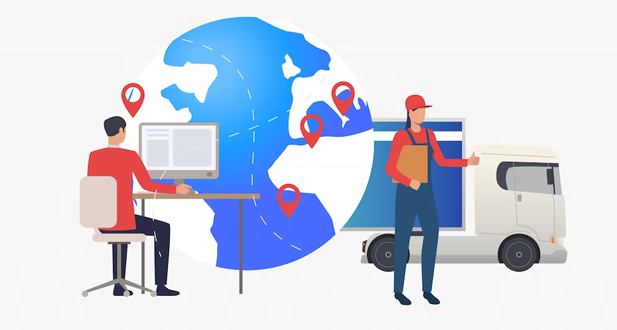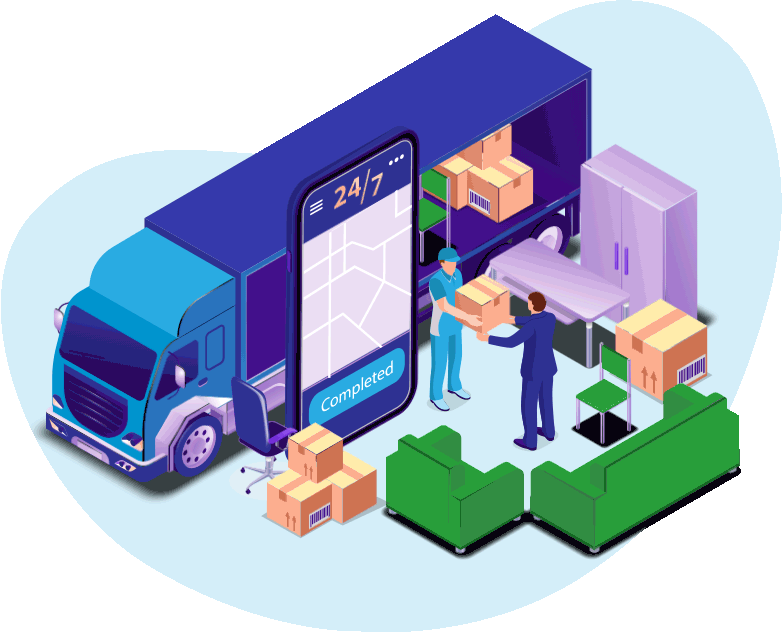How To Choose The Best Logistic Management System:
Logistic management systems are designed to streamline your logistics operations and help you optimize your multiple supply chain functions.
This tool can be used to gain visibility over the entire chain logistics which is essential for day-to-day business operations. By getting the right items to the right customers at the right time, you can increase demand and efficiency in business operations.
The digitization of your supply chain with a logistics management software also allows for you to gain visibility on where items are located, when they will arrive, and how much it costs.
Such a system helps logistics management systems to better manage their operations and also enhance customer experience. By leveraging intelligent technological solutions, it provides excellent automated functionalities that can ease transportation operations and even increase efficiency by creating shipment routes.
Furthermore, it helps to drive process efficiency by managing inventory and processing orders in an efficient manner.
System automation results in a fully automated system that increases efficiency significantly while reducing costs associated with manual labor.
For businesses to make the most of their logistics systems, they should consider implementing a Logistic Management System.
This software can manage warehouse operations, track inventory levels, and provide real-time visibility into the entire supply chain. A good logistics management system will employ advanced tracking software to ensure that all orders are delivered on time and in full.
This will help businesses streamline their production cycles while ensuring faster delivery times. Additionally, businesses should choose efficient transportation services to ensure the timely movement of goods between warehouses or stores and customers.
By employing a logistics management system, companies can ensure seamless logistics operations while reducing costs associated with warehousing and transportation services.
A good logistics management system can improve logistics software and help businesses manage transportation operations. It can provide warehouse management capabilities to assist third party logistics, route planning, supply chain services, and efficient logistics.
Logistics management software can also help businesses improve business processes and provide the needed tools for managing their companies. By using this type of software, businesses can better manage transportation operations, improve their supply chain efficiency, and optimize route planning.
This type of software also helps to reduce costs associated with warehousing and transportation services while providing a comprehensive solution for managing the entire supply chain process.
With the right logistics management system in place, companies can easily manage their operations more efficiently while ensuring that they are able to meet customer demands in a timely manner.
When choosing the best logistics management system, companies need to consider several factors. Firstly, they should include logistics software which will help them track their customers’ location and manage their orders.
Additionally, they should include a driver app that can help save their businesses time and money by allowing them to easily contact delivery agents and receive pick up requests.
Furthermore, it is also important to make sure that the system allows agents to pin exact customer locations so that they can easily opt for which customer is closer for pickup or delivery.
The system should also be able to receive drivers’ routes so that companies can offer complete visibility and route optimization for the most efficient route.
Benefits Of Having A Logistic Management System:

A logistics management system is a supply chain system that helps a company manage its logistics and transportation processes. The available data from a logistics management software can be used to improve business efficiency, cut costs, and improve customer satisfaction.
Transportation management software is based on the available data to help a business process, make informed decisions, and automate the transportation process.
It can also be integrated with other business processes. A major benefit of having a logistic strategy is that it can help you provide quality services to your customers.
Having better visibility of your logistics will help you improve your order processing efficiency. It will also help you cut costs and manage your inventory better. It is important to have a strategy that helps you provide your customers with quality services.
Logistics software can help your company control its expenses and improve the processing of your orders by enabling greater visibility and process automation.
Logistics management software not only helps you manage your inbound freight, but it also helps you control your outbound freight. It helps you track your operational data from the front-end to the back-end, enabling you to make better decisions and cut costs.
The logistics software also provides valuable data and insights that help you maintain an optimum inventory level.
The transportation management feature of the logistics software helps to manage the flow of goods between various transportation means and company control levels.
Logistics softwares order management feature simplifies the order fulfillment process. The warehouse management system improves warehouse efficiency by providing a platform for the dispersal of goods and enhancing productivity by automating and optimizing the communication and collaboration between the warehouse and transportation teams.
The distribution center management solution of logistics softwares helps to automate and streamline the communication between the distribution center and the transportation teams, thereby enhancing the efficiency of the goods transportation.
The 3PL management system provides a 360-degree management of the 3PL systems. It enables real-time accuracy, enhanced compliance adherence, fleet visibility, and better delivery experiences.
An effective logistics management system enables the interoperability and architecture of technologies like Artificial Intelligence, Machine Learning, Predictive Analytics, and Internet-of-Things (IoT) to help businesses create new revenue streams, improve delivery profitability, and deliver delightful customer experiences. Logistics software enables efficient logistics management.
Logistics management is a crucial part of the supply chain process. It requires proper planning, proper cost monitoring, and smooth terms of communication between the vendor and the customer.
A logistics automation system allows companies to improve the overall efficiency of the transportation operations by reducing costs and enhancing customer satisfaction. Transportation management systems are the final stage of the logistics automation process.
They help in determining the requisite amounts of stock quantities based on the supply patterns and customer demand. The transportation management systems also help in collecting and analyzing the data from the SCM and transportation operations to make informed decisions about the supply chains and transportation.
Why Is It Important To Have A Logistic Management System:
Logistics management systems are essential for businesses to track inventory and manage their supply chain. Logistics systems help businesses optimize the logistic management process, from freight management to transportation management and inventory levels.
Through software tools and automated processes, logistics management systems allow businesses to keep up with the digital world as they become more efficient in order fulfillment.
Furthermore, these systems can be used for customer service initiatives such as tracking orders or providing real-time updates on product availability.
By utilizing a logistic management system, businesses can reduce their costs while increasing customer satisfaction through a faster delivery process and better order accuracy.
In conclusion, logistic management systems are invaluable tools that provide companies with the ability to streamline their supply chain operations in an efficient manner while managing inventory levels in a cost effective way.
Good logistic management solutions can aid in route optimization, asset utilization and inventory locations to help improve the overall delivery timelines, operational costs and company effectiveness.
Additionally, solutions such as these can also help speed up the manufacturing process and ensure maximum asset utilization. By using a logistic management system companies can easily maximize efficiency while reducing their costs and improving their overall performance.
Logistics systems help businesses to streamline their operations and ensure that goods arrive on time.
Logistics management software helps companies to manage the production cycle, from raw materials to the delivery of products or services for customers.
This type of software can also be used for various processes such as inventory control and tracking, order fulfillment, routing and scheduling of vehicles, customer service and invoicing. It helps with accurate service delivery, improving customer service as well as reducing production costs.
In addition, it can help companies manage their supply chain systems more effectively by providing a better understanding of the various processes involved in order fulfillment.
Logistic management systems make it easier to manage truly multinational production and fast shipping, as well as sales orders. It is also beneficial for domestic businesses to have a logistics system in place when considering their distribution strategy and export program.
By having an effective way of tracking materials, warehousing, storage, transport and export processes, companies can ensure their goods are delivered in the most efficient way possible.
Logistic management systems provide the tools for companies to better understand the entire supply chain process; from raw materials through to delivery of products or services.
This not only allows businesses to stay competitive but also provides customers with a better experience due to reliable delivery timescales and improved customer service.
Having an efficient logistics strategy is essential for businesses to ensure that goods move from the point of origin to their destination in a timely and cost-effective manner.
Good logistic management lets shippers have control over all aspects of the general supply chain, from proper transportation to freight moves.
It enables them to keep track of their inventory levels and identify any hidden opportunities or areas where they can reduce costs. By controlling the inbound, outbound and internal movements of goods, companies are able to optimize resources and maintain optimal levels throughout the entire supply chain.
This helps them reduce costs and improve customer satisfaction by ensuring that goods arrive on time with minimal disruption.
Logistics management is an important part of any organizational strategic plan, as it helps production processes run more efficiently and allows companies to optimize their order fulfillment.
The management system also helps companies to better control the operation of their deliveries, improving speed and reducing costs. In addition, a good logistics management system improves communication between all parties involved in the delivery process, resulting in quicker and more accurate deliveries.
Furthermore, effective logistics management can help companies reduce expenses related to inventory control and transportation costs which leads to improved economic performance.
How To Create A Logistic Management System:
Creating a Logistic Management System involves defining, designing and implementing the various business processes to ensure efficient management of logistics demands. This includes the Warehouse Management Module, Transportation Management Module, Supply Chain System and Delivery Module.
The Warehouse Management module will help control inventory levels and store products in an organized manner. The Transportation Management module will help manage transportation companies and create shipment deliveries.
The Supply Chain system will integrate all modules together to create a unified system for managing logistics demands. Finally, the Delivery module will provide tracking information for shipments as well as options for payment processing and returns management if needed.
Logistics software and management systems are now an important part of the supply chain for companies, third party logistics (3PL) companies and customers alike. With the right software tools, you can easily manage your chain of supply from production to customers’ doors.
In today’s digital world, logistics software has become a great asset to ensure that goods arrive on time and in perfect condition. Logistics management systems allow businesses to track shipments at every stage, from ordering supplies to shipping them out to customers.
This helps them save time and money by staying organized. Also, it helps create better customer service as they can keep their customers updated with order status tracking information and provide real-time delivery updates for any unforeseen issues that arise during transit or storage.
Logistics management software can help automate the process of managing shipments, deliveries, and items. This can improve operational data accuracy and reduce manual workload for staff members who would otherwise have to input all this information manually.
With a logistics management system in place, businesses can also benefit from enhanced customer experiences and better brand loyalty due to smoother shipment processes.
The improved efficiency also leads to cost savings in time and money when it comes to freight movement. By investing in logistics software, businesses will be able to streamline their operations while providing better customer service with increased visibility and control over their shipments.
Logistics app development can help improve delivery efficiency and automates tasks. A logistics management system should include order management, customer data, fulfillment process and integration of third-party logistics providers.
All this information can be stored in one system to allow customers to see the status of their supply chain processes. Management software is needed to provide users with the ability to track shipments and analyze delivery trends.
This will help businesses improve their delivery time frames while ensuring customer satisfaction.
With a single platform that connects customers, suppliers and carriers, businesses are able to manage orders more efficiently while providing better visibility into their fulfillment process.
Basic logistics software and logistics management systems allow companies to track inventory, manage costs, improve customer service, and increase system efficiency.
Logistics allows businesses to be more competitive while reducing their cost base by utilizing common technical solutions such as cloud-based software modules.
Such modules include data management tools that can provide real-time updates on order status, shipment tracking information and invoicing support.
With this data in hand a business can quickly identify problems with their system and make necessary changes to optimize the performance of their logistics management system.
By integrating the latest technology into their existing processes, businesses can create an efficient logistics system that enhances customer satisfaction while improving overall business performance.
Conclusion
Choosing the best logistic management system requires careful consideration of various factors. It is crucial to evaluate the system’s functionality, scalability, integration capabilities, user-friendliness, and cost-effectiveness to ensure that it meets your business needs.
You should also assess the system’s customer support, security features, and performance metrics to ensure that it provides the level of service required for your logistics operations.
By taking the time to assess these factors, you can find a logistics management system that will streamline your operations, improve efficiency, and help you achieve your business goals.
Frequently Asked Questions
To choose the best logistic management system, you should consider factors such as your business needs, the features and functionality of the software, ease of use, scalability, cost, and customer support.
Both cloud-based and on-premise logistic management systems have their advantages and disadvantages. Cloud-based systems are more flexible, scalable, and require less IT infrastructure, while on-premise systems offer more control, customization, and security. You should choose the option that best suits your business needs and budget.
The costs of implementing a logistic management system may include software license fees, implementation costs, training costs, and ongoing support and maintenance costs. The cost may vary depending on the complexity of your logistics operations and the size of your business.
The time it takes to implement a logistic management system may vary depending on the complexity of your logistics operations, the size of your business, and the software vendor you choose. It can take anywhere from a few weeks to several months.
The software vendor should provide training and support to help you and your staff get up and running on the system. You may also need to provide additional training to your staff to ensure they understand how to use the software and get the most out of its features.



